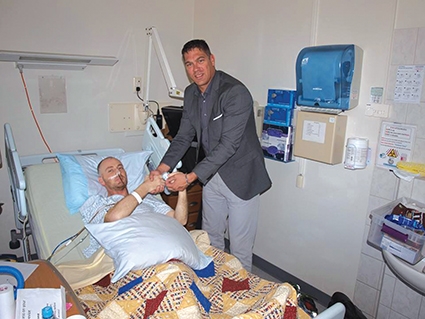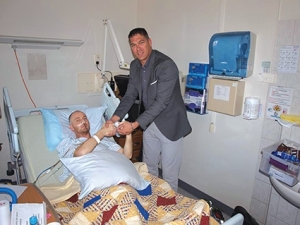Victory Partnership Alliance: Giving Purpose Back to Wounded Georgian Soldiers
Sean Mulcahey, a retired US Army colonel, and Alexander Japaridze, a military doctor, have founded Victory Partnership Alliance, a non-profit organization conducting activities that support wounded Georgian soldiers and their families, enrich their lives and raise their spirits, and assist them with the challenging task of reintegrating back into society as productive and proud citizens of Georgia. GEORGIA TODAY spoke to Mr Mulcahey, founder and CEO of VPA and Mr Japaridze, the Country Director, to find out what inspired them to set up the organization and how they help Georgian wounded heroes cope with life after conflict.
Sean, why did you start the organization?
I was inspired to begin this venture by the strength and courage of Georgian people, the deep sense of moral obligation of those people, their extraordinary generosity as a people, and the demonstration of Georgia having made so much progress over the last several years and Georgia’s effort for international peace and security. Georgia deserves support. Firstly, the purpose of my visit to Georgia was to plan and execute the exercise with Georgians between US and Georgian armed forces. The exercise was an immediate response to 2008. Before that, I spent two years serving as the Commanding Officer of the Warrior Transition Battalion at Ft. Benning, Georgia, developing programs to provide care and support for about 350 wounded US soldiers. This was a very new program in the United States. The US army established wounded warrior units in 2007. That’s where my experience with wounded warriors comes from. I spent two years helping their families to overcome the challenges they faced. Prior to my assignment here, I had become familiar with the situation in Georgia and I had some interest to use my experience and skills and my desire to help Georgians. Then, when I retired from the army, I reconnected with Alex and together we established this organization to provide some help to Georgian soldiers and their families.
How difficult is the situation of the wounded Georgian soldiers?
During my service here the worst challenge we face is getting them employed. Having a job for them is to regain a positive outlook for the future. There are real challenges with accessibility due to their physical limitations. Regarding employment, there are some challenges for those who are apparently on active duty regarding the law as to whether they are allowed to work and get paid as soldiers. I believe that Ministry of Defense is looking at changes to the law. We continue to look for work for them in the areas of agriculture in some of the regions and aim to develop partnerships between governments and businesses. We’ve had conversations with the American Chamber of Commerce to get their support, helping to promote the idea of getting businesses to employ veteran soldiers with disabilities in companies in Georgia. As our organization is a partnership, we connect several other organizations in all sectors, including academic institutions and nonprofits, allowing us to create support for soldiers at very low cost. We are in discussion with the McLain Association for Children also, which supports disabled children in Georgia. Getting disabled soldiers involved in a project helping disabled children achieves two things: number one – it helps the disabled child and number two – it provides a sense of value and self-worth for disabled soldiers and demonstrates to the Georgian people that a disabled soldier, while he may have some physical limitations, is still a valuable member of society. These soldiers still have a sharp mind, lots of abilities and we can’t allow their disabilities to become a focus of our attention- they still have so much to offer to society.
Have you discussed this issue with the Ministry of Defense?
Yes. We’ve raised this issue with them and soldiers are also involved. I’d like to add that more importantly during these nine month, we have earned the trust of our beneficiaries. We have proven the ability to execute projects that have a direct impact on our beneficiaries and create ways for Georgian people to act, to do something to support these soldiers. Our approach is based on the simple idea that together we can do more than any of us can do alone.
Alexandre, how did you get involved in this issue?
I am a military doctor and the issue of wounded soldiers is close to my heart. The first and most important experience for me was the Martqophi project in the framework of the Georgian-American exercises last year. I talked to the director of the institution about our organization and offered our help to the wounded soldiers. She asked us to repair the pavilion. Then we suggested the wounded soldiers work on repair works themselves and they did everything on their own. A couple of great things were done: we repaired pavilion and wounded soldiers were given a job to get done. Some of them even told me personally that for the first time [since being injured], they felt that they were valuable and necessary for someone and one even had tears in his eyes as he said this. Before establishing the organization, a lot of things passed me by- the lack of ramps at building entrances, for example. Now, wherever I go, I notice it. Our first aim is to raise public awareness of the issue so people see what troubles our wounded soldiers face. If this happens, the heads of those institutions will start caring for the soldiers themselves. They will make wheelchair ramps into their buildings in order for the soldiers to have access. Another goal is to reintegrate them into society that they feel productive members of society once more.
Meri Taliashvili











